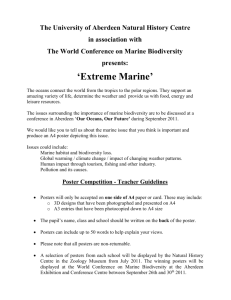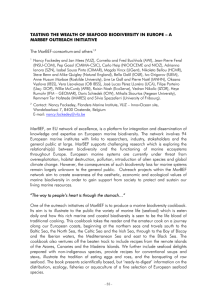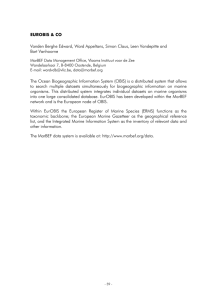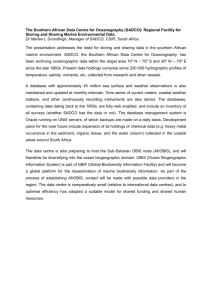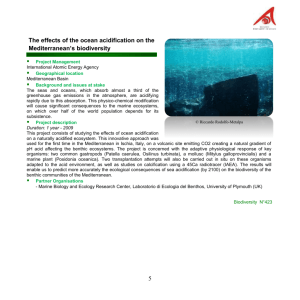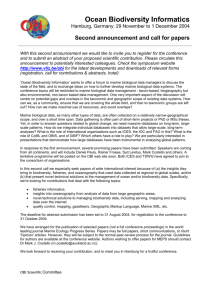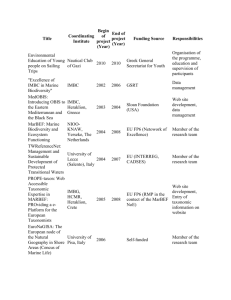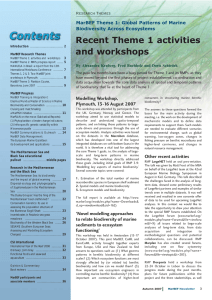Document 11803051
advertisement
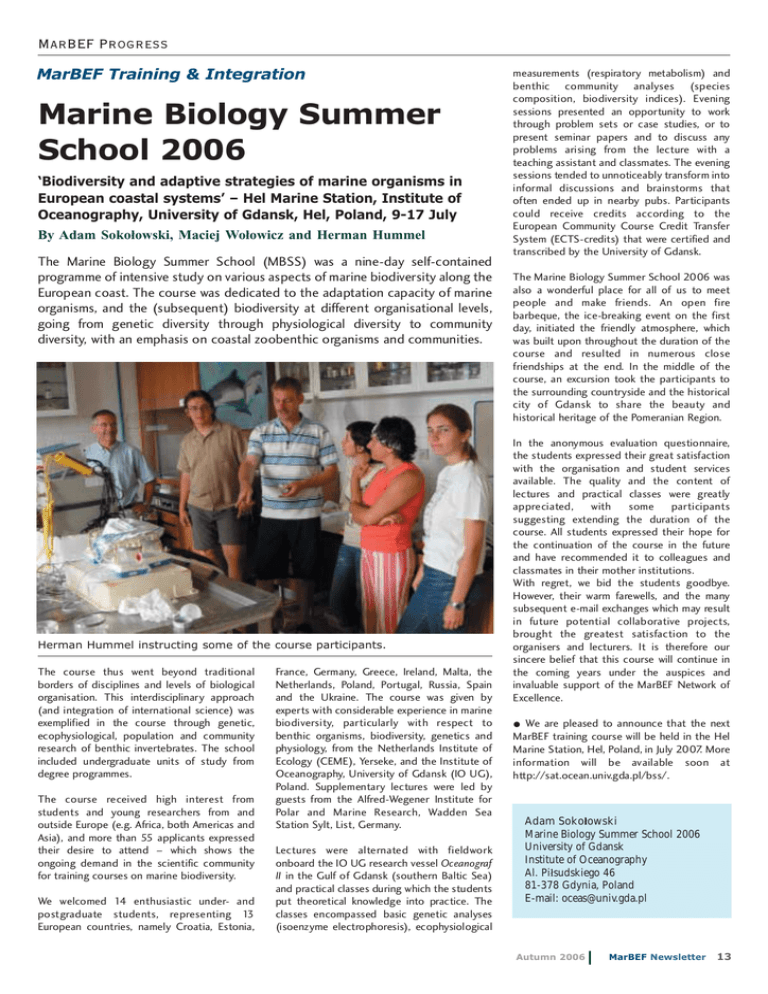
MarBEF Progress MarBEF Training & Integration Marine Biology Summer School 2006 ‘Biodiversity and adaptive strategies of marine organisms in European coastal systems’ – Hel Marine Station, Institute of Oceanography, University of Gdansk, Hel, Poland, 9-17 July By Adam Sokołowski, Maciej Wołowicz and Herman Hummel The Marine Biology Summer School (MBSS) was a nine-day self-contained programme of intensive study on various aspects of marine biodiversity along the European coast. The course was dedicated to the adaptation capacity of marine organisms, and the (subsequent) biodiversity at different organisational levels, going from genetic diversity through physiological diversity to community diversity, with an emphasis on coastal zoobenthic organisms and communities. Herman Hummel instructing some of the course participants. The course thus went beyond traditional borders of disciplines and levels of biological organisation. This interdisciplinary approach (and integration of international science) was exemplified in the course through genetic, ecophysiological, population and community research of benthic invertebrates. The school included undergraduate units of study from degree programmes. The course received high interest from students and young researchers from and outside Europe (e.g. Africa, both Americas and Asia), and more than 55 applicants expressed their desire to attend – which shows the ongoing demand in the scientific community for training courses on marine biodiversity. We welcomed 14 enthusiastic under- and postgraduate students, representing 13 European countries, namely Croatia, Estonia, France, Germany, Greece, Ireland, Malta, the Netherlands, Poland, Portugal, Russia, Spain and the Ukraine. The course was given by experts with considerable experience in marine biodiversity, particularly with respect to benthic organisms, biodiversity, genetics and physiology, from the Netherlands Institute of Ecology (CEME), Yerseke, and the Institute of Oceanography, University of Gdansk (IO UG), Poland. Supplementary lectures were led by guests from the Alfred-Wegener Institute for Polar and Marine Research, Wadden Sea Station Sylt, List, Germany. Lectures were alternated with fieldwork onboard the IO UG research vessel Oceanograf II in the Gulf of Gdansk (southern Baltic Sea) and practical classes during which the students put theoretical knowledge into practice. The classes encompassed basic genetic analyses (isoenzyme electrophoresis), ecophysiological measurements (respiratory metabolism) and benthic community analyses (species composition, biodiversity indices). Evening sessions presented an opportunity to work through problem sets or case studies, or to present seminar papers and to discuss any problems arising from the lecture with a teaching assistant and classmates. The evening sessions tended to unnoticeably transform into informal discussions and brainstorms that often ended up in nearby pubs. Participants could receive credits according to the European Community Course Credit Transfer System (ECTS-credits) that were certified and transcribed by the University of Gdansk. The Marine Biology Summer School 2006 was also a wonderful place for all of us to meet people and make friends. An open fire barbeque, the ice-breaking event on the first day, initiated the friendly atmosphere, which was built upon throughout the duration of the course and resulted in numerous close friendships at the end. In the middle of the course, an excursion took the participants to the surrounding countryside and the historical city of Gdansk to share the beauty and historical heritage of the Pomeranian Region. In the anonymous evaluation questionnaire, the students expressed their great satisfaction with the organisation and student services available. The quality and the content of lectures and practical classes were greatly appreciated, with some participants suggesting extending the duration of the course. All students expressed their hope for the continuation of the course in the future and have recommended it to colleagues and classmates in their mother institutions. With regret, we bid the students goodbye. However, their warm farewells, and the many subsequent e-mail exchanges which may result in future potential collaborative projects, brought the greatest satisfaction to the organisers and lecturers. It is therefore our sincere belief that this course will continue in the coming years under the auspices and invaluable support of the MarBEF Network of Excellence. • We are pleased to announce that the next MarBEF training course will be held in the Hel Marine Station, Hel, Poland, in July 2007. More information will be available soon at http://sat.ocean.univ.gda.pl/bss/. Adam Sokołowski Marine Biology Summer School 2006 University of Gdansk Institute of Oceanography Al. Piłsudskiego 46 81-378 Gdynia, Poland E-mail: oceas@univ.gda.pl Autumn 2006 MarBEF Newsletter 13
